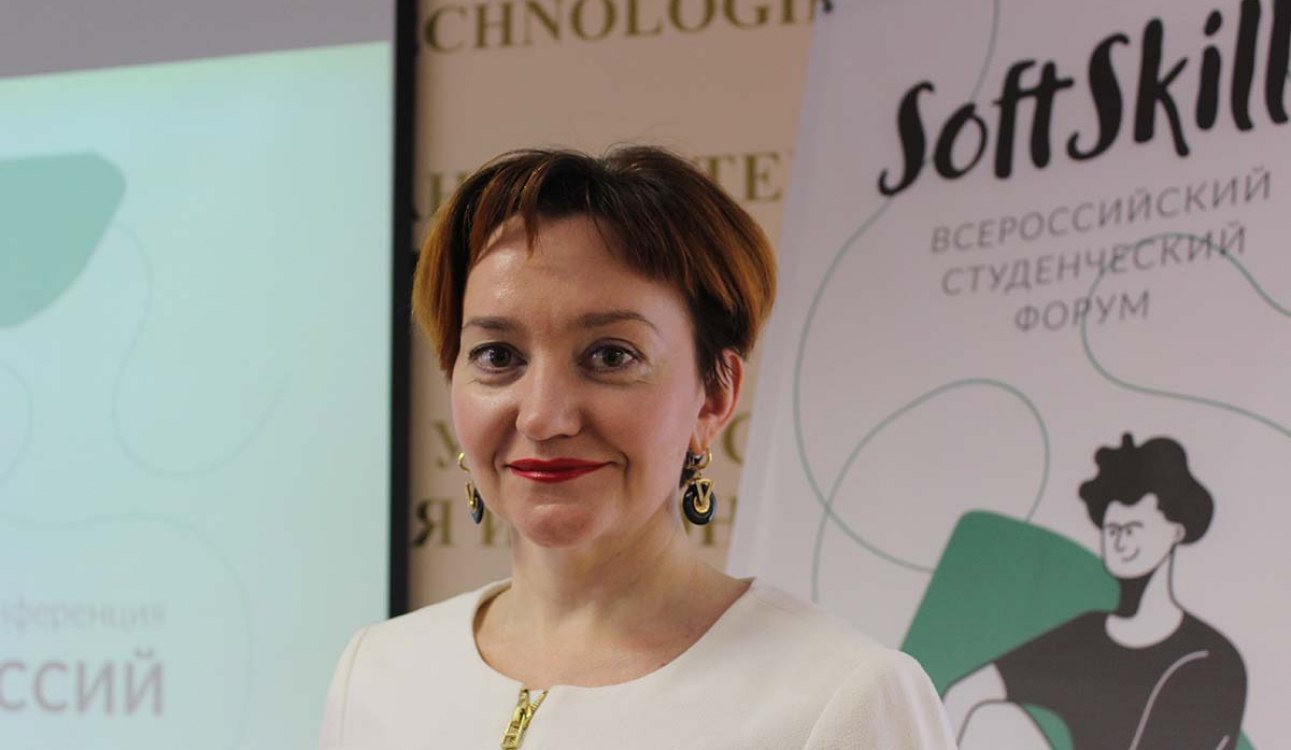
The talent or mastery?
30 December 2023
Associate Professor of the Department of Pedagogy and Psychology, candidate of philological sciences Ksenia Kuzmina talked about how to become a teacher.
2023 is the year of teacher and mentor. Inquisitive students from the Institute of “Creative Industries and Hospitality” student scientific society, looking for a person who is able to tell in detail about teaching skills, got acquainted with Ksenia Kuzmina. A linguist by education, candidate of philological sciences, and former head of Sberbank's PR service, she teaches in several departments of the St. Petersburg University of Management Technologies and Economics: pedagogy and psychology, management and state and municipal administration, international finance and accounting. She is a winner in “Scientist 2022” contest in “Science and Innovation” nomination. Ksenia told аbout teaching, university and students in a specific interview for the project “SNO knows!”.
- How do people become teachers?
- Everyone navigates their own way, choosing what to be. Generally, the professional educator’s path starts with shaping one’s values and visualizing oneself as a future educator, teacher and mentor. It seems to me I had it a very harmonious way. I am from teachers’ dynasty. When my mother asked me in 5th grade: “What do you want to focus on: music or languages?”, - I answered that music would be for my soul and languages for development.
- Has your willing to teach been born at that age or after some time?
- I cannot tell if it was deliberate or if it just worked out that way. I remember myself in 1st-3rd grade, when I “role-played school”, I really liked to fill out the journals. I would come home after school and repeat everything I had heard from the teacher to my learners – dolls and other children’s toys. Then it turned out that I had to be financially responsible at an early age in my family. When I was in 9th grade, my dad died following a trauma. Therefore, I started tutoring, using the language basis I got with the help of my parents. After 11th grade, I knew that I would definitely learn linguistics and educate.
- It turns out that in your case desire, opportunities and support coincided. What else do you think is needed?
- Probably, above all you need to love the thing you are doing, since an educator, teacher and mentor are those professions that require abilities - I do not say it is the talent or predisposition to giving knowledge. When one likes to communicate with the audience, likes to notice the results. It does not matter if it’s school or university, but one way or another it is significant for an educator or a teacher to see the results of your activity. Moreover, it is not only about sharing knowledge. It is more about how you help another person, another emerging person, fulfill their potential.
- You mentioned the word “talent”. The talent and mastery are opposite things in many professions. Do you think an educator needs a talent or it is enough to master the skill?
- Teachers, researchers, practitioners and theorists understand such a capacious concept as pedagogical mastery differently. For me, pedagogical mastery is the highest point of a teacher's development and the very process of their development as a professional, when they strive to become a good teacher and mentor. This is the stage of professionalism, when values are laid down, which predetermines a further path. It is a stage of professional development when a teacher has the maximum of experience but has not lost their interest. Pedagogical excellence is not just professionalism that can be read through some competencies. It is the ability to bring in new things, one's own innovative approach, on the one hand, and on the other hand, it is the ability to apply existing best practices. In addition, of course, it is creativity. Pedagogical excellence without creativity is impossible.
- Do you have any personal criteria for evaluating a good teacher?
- The success of their students.
- What is the main teacher incentive?
- The opportunity to see how your students develop. It might be freshmen or established experienced managers at the Presidential Program.
- Are you a strict examiner?
- No. I prefer developing informative courses and require intensive studying during the course. By the exam date I already understand what skills and knowledge have been formed. Therefore, those students who make diligent progress during the course pass exams without any problem.
- Аre there students you would never go out of your way to reach out to while trying to show sympathy?
- Perhaps, I do not have this kind of students. I will try to understand. Empathy is everything. It is a quality a teacher needs. Another thing is that you should not lower the level of requirements to the knowledge quality because of empathy.
- What do you think the difference between an educator and a mentor is?
- Educator is a broader concept. Mentor is one of the roles that an educator can take on.
Darya Luginina
Translated from Russian into English by Diana Klyapitskaya